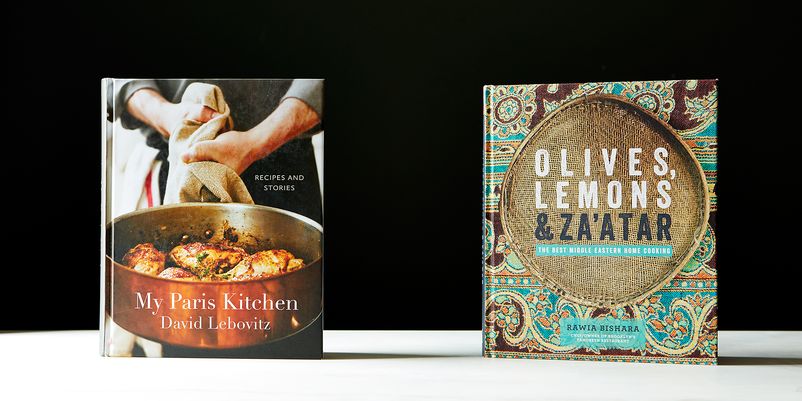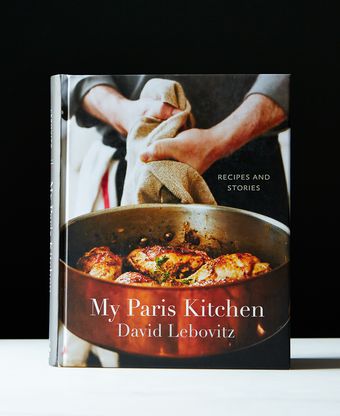First, a confession: I’m exclusively a weekend cook. There, I’ve said it. Though my shelves full of well-thumbed cookbooks collected over many years might lead you (and my husband) to think otherwise, my kitchen time is -- sadly -- limited to a few precious hours on weekends. Which is to say, the cookbook that piques my interest most will be one that meshes nicely with the schedule of someone who doesn’t have tons of time to plan, shop, chop, and stir, much as she’d like to. I’m looking for recipes that will keep me coming back again and again. Bonus points for photographs that make me hungry and text that gives me a good sense of the cook behind the book.
With that as caveat and preamble, let’s explore these two books: Olives, Lemons & Za’atar by Rawia Bishara, and My Paris Kitchen by David Lebovitz. Lucky me! I love all of these things: olives, lemons, za’atar, and Paris.
In her introduction, Bishara explains that her name -- Rawia -- means storyteller in Arabic. “Rather than narrate the stories about my family, life and culture,” she writes, “I prefer to tell them through my cooking.” Bishara is from a Palestinian-Arab family from Nazareth, in southern Galilee, and has run the restaurant Tanoreen in Bay Ridge, Brooklyn, since 1998. Her recipes are shaped by memories of her mother’s cooking, with splashes of influence from her adopted home in New York. I loved her vivid childhood recollection of driving through the hills of Galilee en route to her grandparents’ house: “A colorful mosaic of rooftops stretched into the horizon, each one laden with vegetables and herbs drying in the sun. There were plum tomatoes, eggplant, okra, wheat, sesame seeds, thyme, sumac, figs, apricots, and spearmint -- a mouthwatering bounty that would be stored for winter cooking and eating.”
I decided to make Bishara’s Chicken Tagine -- “the Tanoreen version of the iconic Moroccan dish” -- which incorporates a lot of the things I love: dried fruit, aromatic spices, tons of fresh herbs, and slow cooking. You rub the chicken pieces in a spice mix including allspice, coriander, turmeric, cumin, saffron, nutmeg, and cardamom; sear the pieces in oil; sauté onions and garlic; stir in big handfuls of chopped cilantro, basil, and parsley; add dried fruit and lots of lemon juice; and then bake the whole shebang over sliced potatoes, carrots, and pearl onions.
This is a dish that cries out for a sous-chef to share chopping duties, which are many and time-consuming. I balked at using the designated full cup of olive oil to sear the chicken; I probably used about half that. In the end, the cooking time was out of whack: When the chicken was done, the potatoes and carrots were still hard. Also, the double starch of serving a tagine cooked with potatoes over rice seemed odd. It was a fine dish but not spectacular, considering the labor involved, and a bit of a mess on the plate. I liked it more than my family did.
I see the words “brussels sprouts” and I say “yes, please, and lots of them!” so Bishara’s recipe for Brussels Sprouts with Panko was a must-make. These are pan fried in oil, then topped with a tahini/yogurt/pomegranate molasses sauce and sautéed garlicky bread crumbs. What’s not to love? The sauce is utterly delicious and addictive. I’d happily put it on salad, toast, ice cream -- heck, I’d put it on my toothbrush.
I’ll absolutely come back to this recipe, with some modifications. First, I challenge you to get a halved brussels sprout soft enough to eat after just two to three minutes on the stove, as instructed. Maybe I didn’t use enough oil. Maybe my stove doesn’t get as hot as hers does. But that strikes me as impossible. Also, if you were to drench the sprouts with all 2 cups of the tahini sauce she calls for, they’d be swimming in it. Ditto for the breadcrumbs. Proportions seem to be a problem.
But Bishara’s Lentil Noodle Soup with Greens was a winning recipe, a delicious and earthy thick soup packed with spinach, kale, and fettuccine, and zinged with lemon. Our 12-year-old daughter gave it an enthusiastic thumbs up, and insisted that this soup make it into regular rotation in our house. It will.
Here’s the problem: There aren’t a lot of other recipes in Bishara’s book that tempt me. I don’t need another recipe for hummus or tabouleh. Lots of her recipes require you to make another recipe elsewhere in the book as a key component. I don’t like bouncing from chapter to chapter; that’s pretty much a deal-breaker for me.
Also, I found inconsistencies and sloppiness that don’t inspire confidence. For example, a lamb dish mistakenly calls for chicken. A recipe for seasoned garlic sauce says it can be refrigerated for one month, but a few lines later says “up to 1 week.” Another recipe appears in the book twice -- identically -- once as string bean and tomato stew, and again later as sautéed string beans.
Finally, a plea from all of us whose eyesight isn’t what it used to be: Cookbook designers, please swear off the delicate pale and tiny typeface! When I’m cooking, I really don’t want to squint.
While Olives, Lemons & Za’atar is a loving reconstruction and reimagining of the foods of Bishara’s childhood, David Lebovitz’s My Paris Kitchen is his tribute to the foods of his adopted home, where he’s lived for more than a decade while blogging about his culinary adventures. Before that, he was a professional chef and baker for many years in the Bay Area, including some 13 years at Chez Panisse.
This is a chatty book -- the subtitle is “Recipes and Stories,” after all. We learn about Parisian heat waves, Lebovitz’s quest for a big sink, his deeply lamented cookbook collection lost in transatlantic transit, his first restaurant job (at a “sirloin pit” chain in a strip mall), his crush on the sausage vendor at his market, and much more. He is an entertaining and breezy host on the page, as I imagine he is in person. And his vivid descriptions transport you to the bistros and market stalls of Paris, where he fills his basket with redolent cheeses or spatchcocked rotisserie chicken so delicious he can’t help tearing off and devouring the crispy skin as soon as he’s in his front door. “Anyone who tells you that people in France don’t gain weight,” he writes, “doesn’t live within walking distance of a good rotisserie chicken stand.” Gorgeous photographs by Ed Anderson accompany many of the recipes.
Lebovitz is a forgiving and fun kitchen guide. He encourages his readers to follow their instincts, and sprinkles his recipes with advice such as this: “press down with the heels of your hands on the chicken very firmly -- like you’re giving it a shiatsu massage -- to flatten it as much as you possibly can. Don’t go easy on it.”
On first read, I dog-eared page after page of recipes I was eager to try. Counterfeit duck confit! French onion soup, gooey with Gruyère! A simple winter salad of endive and Roquefort! So far, I’ve made none of those (but still plan to). I was too busy making his version of the classic café sandwich, the croque-monsieur, which was a revelation: a thin smear of rich béchamel binding the grilled bread to melting Comté cheese and salty ham. Fantastic. So fantastic, I made it two days in a row. Lebovitz’s buttery and sagey butternut squash crumble was a hit (if maybe more American than French). Ditto the green beans with snail butter (no snails involved, just massive amounts of butter and garlic). And everyone swooned over his salted butter caramel-chocolate mousse.
You may notice a theme: lots and lots of butter. This is not a book for the literally faint of heart. And the recipes I chose were simple, straightforward ones. I didn’t tackle Lebovitz’s cassoulet, a three-page endeavor (plus a two-page introduction), or his 14-step Bûche de Noël. But I know I’ll be coming back to this book again and again.
Lebovitz accrues demerit points for numerous, cringe-worthy mistakes with the French terms he sprinkles throughout his text. There are so many that I (full disclosure: French major and former proofreader) stopped flagging them: wrong noun genders, misplaced accents, misspellings. Violà instead of voilà? Dude! You’ve lived in Paris for more than a decade! You have a French partner! Copy editor, où êtes-vous?
Still. I’ll forgive. Gaul wins.



44 Comments
I was shocked, incidentally, at the amount of typos in the Za'atar cookbook! I'm sure I'm not a perfect writer, but it says so much about a person when the writing is sloppy and bland. My decision not to buy a cookbook with that amount of errors is immediate. Thanks for your review! (It helps that you have children as well. I'm sure a lot of us can relate with having to find recipes that the whole household will like.)
Just a thought.